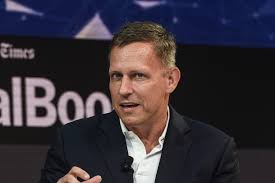
Breaking News
 Father jumps overboard to save daughter after she fell from Disney Dream cruise ship
Father jumps overboard to save daughter after she fell from Disney Dream cruise ship
 Terrifying new details emerge from Idaho shooting ambush after sniper-wielding gunman...
Terrifying new details emerge from Idaho shooting ambush after sniper-wielding gunman...
 MSM Claims MAHA "Threatens To Set Women Back Decades"
MSM Claims MAHA "Threatens To Set Women Back Decades"
 Peter Thiel Warns: One-World Government A Greater Threat Than AI Or Climate Change
Peter Thiel Warns: One-World Government A Greater Threat Than AI Or Climate Change
Top Tech News
 xAI Grok 3.5 Renamed Grok 4 and Has Specialized Coding Model
xAI Grok 3.5 Renamed Grok 4 and Has Specialized Coding Model
 AI goes full HAL: Blackmail, espionage, and murder to avoid shutdown
AI goes full HAL: Blackmail, espionage, and murder to avoid shutdown
 BREAKING UPDATE Neuralink and Optimus
BREAKING UPDATE Neuralink and Optimus
 1900 Scientists Say 'Climate Change Not Caused By CO2' – The Real Environment Movement...
1900 Scientists Say 'Climate Change Not Caused By CO2' – The Real Environment Movement...
 New molecule could create stamp-sized drives with 100x more storage
New molecule could create stamp-sized drives with 100x more storage
 DARPA fast tracks flight tests for new military drones
DARPA fast tracks flight tests for new military drones
 ChatGPT May Be Eroding Critical Thinking Skills, According to a New MIT Study
ChatGPT May Be Eroding Critical Thinking Skills, According to a New MIT Study
 How China Won the Thorium Nuclear Energy Race
How China Won the Thorium Nuclear Energy Race
 Sunlight-Powered Catalyst Supercharges Green Hydrogen Production by 800%
Sunlight-Powered Catalyst Supercharges Green Hydrogen Production by 800%
Peter Thiel Warns: One-World Government A Greater Threat Than AI Or Climate Change

Speaking to the New York Times' Ross Douthat, Thiel argued that the default political response to global crises—centralized, supranational governance—could plunge humanity into authoritarianism.
Thiel, co-founder of PayPal and Palantir, shared his worries using examples from dystopian sci-fi stories. "There's a risk of nuclear war, environmental disaster, bioweapons, and certain types of risks with AI," Thiel explained to Douthat, suggesting that the push for global governance as a solution to these threats could culminate in a "bad singularity" - a one-world state that stifles freedom under the guise of safety.
Thiel critiqued what he described as a reflexive call for centralized control in times of peril.
"The default political solution people have for all these existential risks is one-world governance," Thiel observed, pointing to proposals for a strengthened United Nations to control nuclear arsenals or global compute governance to regulate AI development, including measures to "log every single keystroke" to prevent dangerous programming. Such solutions, the investor warned, risk creating a surveillance state that sacrifices individual liberty for security.
Drawing on historical and philosophical analogies, Thiel referenced a 1940s Federation of American Scientists film, One World or None, which argued that only global governance could prevent nuclear annihilation. Thiel juxtaposed this with a Christian theological framing: "Antichrist or Armageddon?" In both, the billionaire said he sees a binary choice between centralized control and catastrophic collapse. Yet, Thiel questioned the plausibility of a charismatic "Antichrist" figure seizing power through hypnotic rhetoric, as depicted in apocalyptic literature. Instead, he offered a modern twist: the path to global control lies in relentless fearmongering about existential risks.
"The way the Antichrist would take over the world is you talk about Armageddon nonstop," Thiel explained. The billionaire contrasted this with earlier visions of scientific progress, like those of 17th- and 18th-century Baconian science, where the threat was an evil genius wielding technology. Presently, Thiel argued, the greater political resonance lies in halting scientific advancement altogether. "In our world, it's far more likely to be Greta Thunberg than Dr. Strangelove," he quipped, invoking the radical Swedish climate activist as a symbol of anti-progress sentiment.

 He 3D Printed a Whole House
He 3D Printed a Whole House

